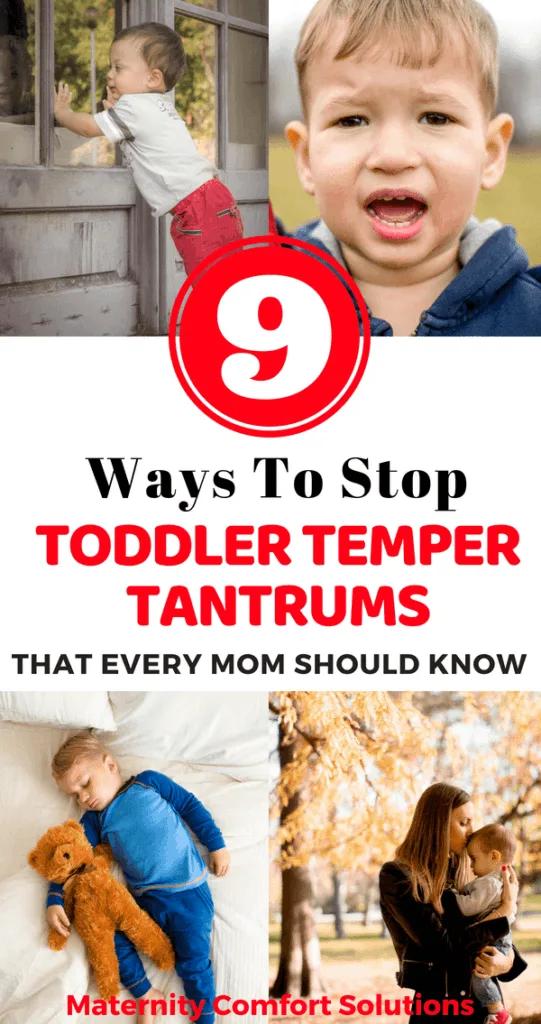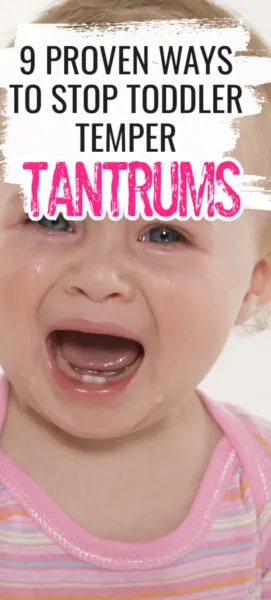Updated August 30, 2022

Toddler temper tantrums are incredibly frustrating for most parents.
We often internalize our child’s behavior and feel like good parents when our toddlers are angelic and feel pretty bad when they have a nuclear meltdown in the grocery store check-out line.
Tantrums are a normal part of a child’s development. Completely normal.
The best-behaved toddlers have tantrums sometimes too.

Toddler temper tantrums are most common between 18 months and 3 years.
Toddlers at this age are just beginning to develop language skills and limited vocabulary.
You mix a toddler’s desire to exert their independence and control with an inability to verbalize wants and needs and you have the perfect recipe for frustration and tantrums.
Today we are sharing 9 ways to stop toddler temper tantrums that work for us in our house and worked for me when I was an early childhood educator with a room full of 2-year-olds.
9 Ways to Stop Toddler Temper Tantrums:
1. Don’t give In to demands.
Ignore the tantrum, but not your child’s feelings.
Don’t add fuel to the fire in the form of negative attention. Remain firm and don’t give in to their demands.
Keep your voice level and repeat yourself.
For example “X is not dinner food, we are having Y”.
Stick to it and your child will understand that you won’t change your mind.
If a tantrum happens in public, leave. Remove your toddler from the situation. It is a royal pain to have to do that, but it sends a clear message that throwing a tantrum is not acceptable and will not be rewarded.
This can help make future outings tantrum-free.
The key is to not lose your cool but to model appropriate emotions. Calmly leave the store, don’t storm out, don’t raise your voice.
Rather than trying to reason with your child during a tantrum, take a deep breath and don’t invest energy in a heated situation that is only going to escalate.
You could say “I’m sorry you are angry, I know you want a candy bar for dinner, but we are having chicken. When you calm down, we can talk about it.”
It is very important to remember that the outcome of this encounter is not forgotten.
If you give in to your toddler’s demands, you may only be laying the groundwork for more difficult confrontations in the future.
2. Be Consistent
Consistency is key. Have consistent routines for meals, bedtime, playtime, and shopping.
Give 5-minute warnings for transitions between activities.
Before going into a store, tell your child what items you are going to get and stick to your list.
You may respond to a toddler’s demand appropriately and firmly 10 times and though the encounters seem fruitless, in the end, you are doing the right thing.
There is a term “No good deed goes unpunished” and this expression has its own interpretation in the mind of a toddler.
If you start giving in to tantrums, you are only going to encourage more of the same behavior.
As parents, we have to set boundaries and remain consistent in applying them.
Stick to your rules and the consequences or your toddler won’t follow them.
3. Help your toddler relieve frustration.
Frustration is often the root cause of many toddler meltdowns.
Toddlers have limited coping and communication skills which can easily lead to short fuses and tantrums when they become frustrated.
Help them express themselves.
You can say to them “I see you are very angry/frustrated/sad because you wanted X.”
If the frustration is with a task, step in to help them accomplish the task and praise their effort and hard work.
4. Validate Their Feelings
When the tantrum is over and the situation has calmed down, you will have an opportunity to spend some quality time with your child and validate their feelings.
This is such an important step and can be extremely beneficial before a situation leads to a full-blown tantrum. Validate their wants and feelings.
Children want to be heard and understood. Respond with “ You wanted X, and you are angry and sad they couldn’t have X”. Model empathy and understanding.
Offering solutions and alternatives can help your toddler develop coping skills.
5. Consider Hunger and Sleep
Preventing tantrums is as important as stopping them.
Remember, your toddler often doesn’t have the coping skills or vocabulary to express when they are hungry or overtired.
As adults, we know when to step back and realize we haven’t eaten in hours or slept in days.
That isn’t true for toddlers.
Making sure your child is well-rested and not hungry can go a long way to preventing tantrums.
Offering a snack or drink or cuddle time with a book can sometimes defuse a toddler who is about to go nuclear.
Bring snacks with you when you run errands. Do naptime before the grocery store.
6. Don’t yell, spank or internalize your child’s behavior
When dealing with a tantrum, it is imperative to remember that toddlers struggle to communicate. It is important that you remain calm and in control. The tantrum isn’t about you.
Don’t internalize it. Speak softly. If your toddler is safe and you need to regroup, walk away.
Do not resort to physical discipline. Physical discipline usually is the result of a parent getting frustrated and angry.
It has been shown that physical discipline is no more effective than other types of discipline and increases aggression.
Your toddler is too young to connect their behavior to the spanking. The only thing they learn is that it is OK to hit someone when you are angry.
7. Offer age-appropriate toys
In this rapidly changing world, largely due to easier communication and technology, it is easy to choose toys for our children that are more advanced without realizing we are doing this.
This can lead to our toddlers getting frustrated which can lead to tantrums.
It is important to focus on age-appropriate toys and educational activities that are suitable for your child’s stage of development.
8. Try To Calm Down and Communicate
In the midst of toddler temper tantrums, parents need to take a deep breath, count to 10, and think about how to best resolve the conflict.
It can be helpful to remember that toddlers have not mastered:
- Reasoning
- Understanding cause and effect
- Emotions
- Consequences
This is not to say they are not learning these higher-level functions.
In fact, it is through experiences such as tantrums that they begin to build their library of coping skills to process conflicts.
Choosing to react rather than respond to a toddler that has no understanding of the basis for disciplinary action will only escalate the situation.
If you feel yourself losing your cool, step back and regroup.
Modeling calmness in handling conflict is one of the best lessons you can teach your toddler.
9. Distract With Play
Often times the best approach can be to simply distract your child with another activity that you know will spark his or her interest.
This is one time when we should feel fortunate that toddlers can be easily distracted.
There are many ways you can distract your child.
This is a time when you want to appeal to your child’s favorite activities that require cognitive function.
Turn on some music and start singing or dancing.
Sit down and start to color or read a book they love.
You want the diversion to focus on capturing attention using verbal communication and eye contact.
Toddler temper tantrums are going to happen. Even the best-behaved toddlers have tantrums.
If you feel your toddler’s temper tantrums are escalating or if your toddler is hurting themselves or others during a meltdown, it is important to discuss this with your pediatrician.
Other articles you may find helpful:




